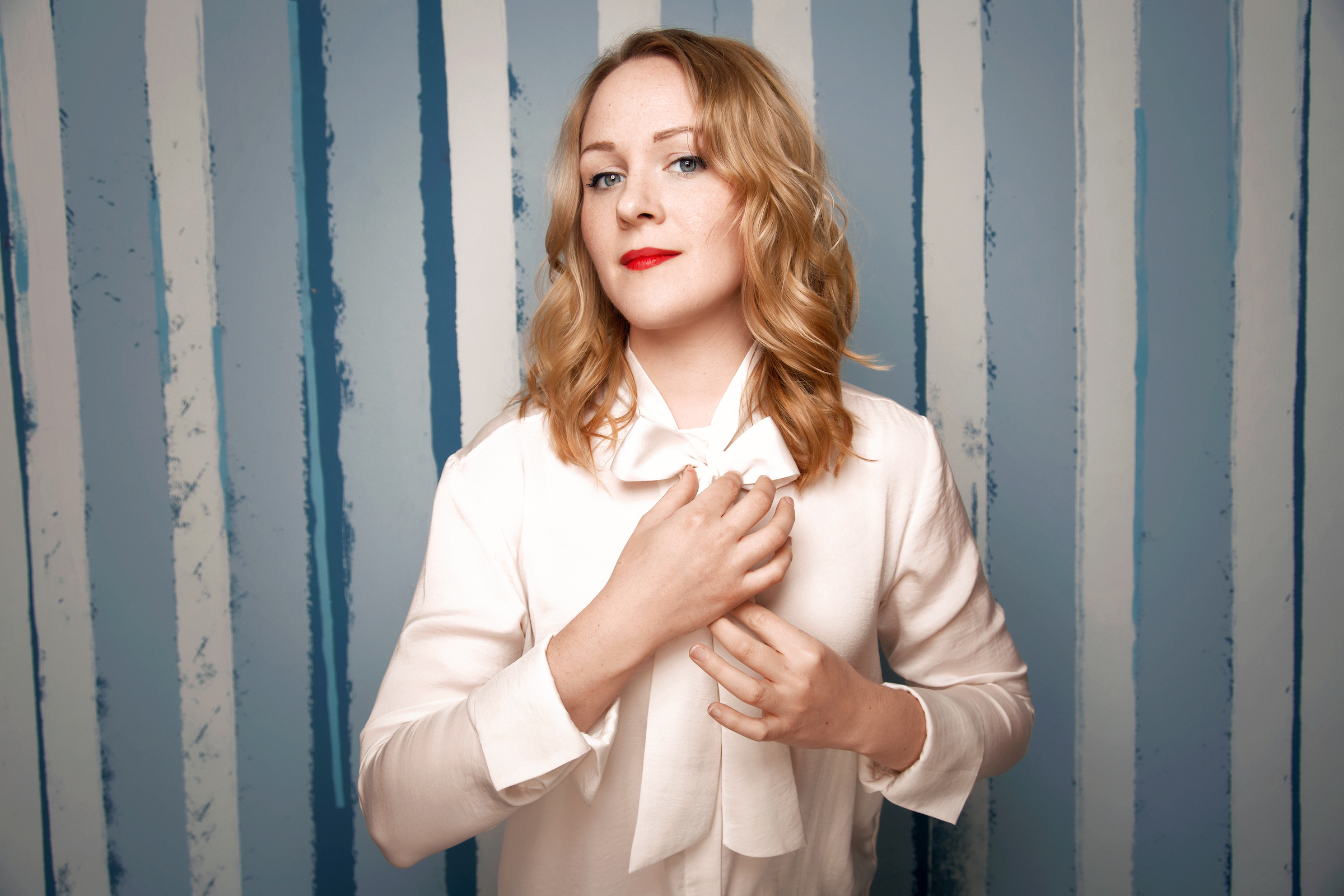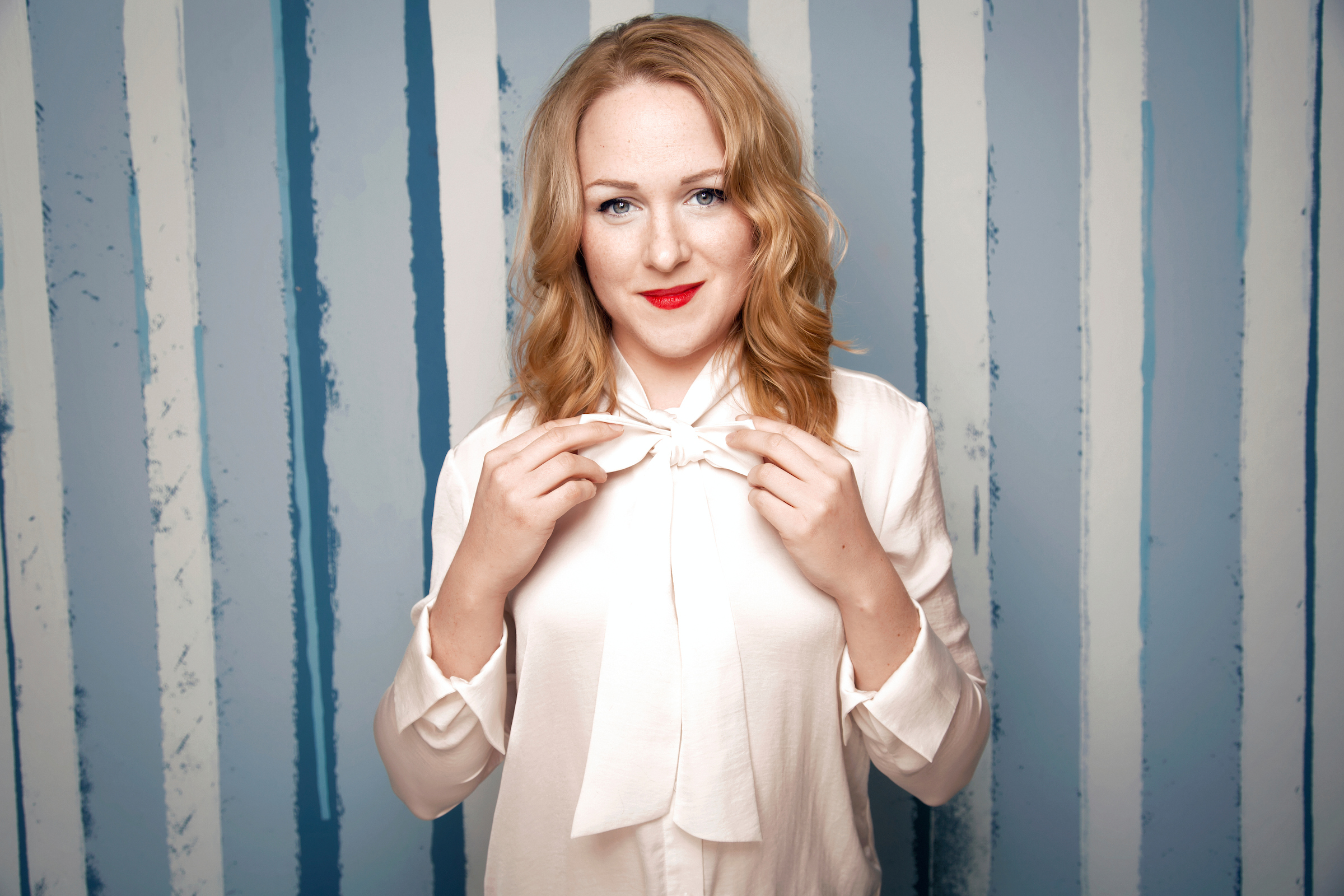
With a reality star in the White House and late-night comedy ratings soaring, Ariel Dumas ’05 has found the perfect time to succeed in show business.
A Second City improv alum and an Emmy-nominated comedy writer for The Late Show with Stephen Colbert, Ariel Dumas ’05 has a flair for crafting zingers from the Zeitgeist. But few writing prompts can get Monday brainstorming off to a better start, she says, than being called out by President Donald Trump in an early morning tweet.
Late Night host are dealing with the Democrats for their very “unfunny” & repetitive material, always anti-Trump! Should we get Equal Time?
— Donald J. Trump (@realDonaldTrump) October 7, 2017
“He seems to be less supervised on the weekends, so Mondays are especially crazy because there’s just so much to respond to,” Dumas says about the nation’s top tweeter. Trump’s request for “equal time” inspired The Late Show writing team to cast Jon Stewart in a crowd-pleasing cameo appearance that night, trying—unsuccessfully—to provide fair and balanced counterpoints to Colbert’s pungent criticism. “I hate it when people say, ‘Wow, the jokes must write themselves these days’—because I can tell you no, they really don’t,” Dumas says. “I’d much rather have a normal president and fewer comedy opportunities than the situation we’re in right now. But he has definitely been good for business.”
In fact, since Trump took office, The Late Show has risen to the top of the late-night ratings, due in large part to the program’s emphatic coverage of our unprecedented political moment. For Dumas, that means work assignments that can include finding a way to make the GOP tax bill funny, punching up a script on the Alabama senate race, or leaving the studio to cover the liquidation of Gettysburg’s presidential wax museum. But no matter how clever the copy, the best laid plans can always be disrupted by late-breaking news.
“One of the clichés of writing is that you have to ‘kill your darlings,’ but in this environment it’s more likely your darlings will be killed for you,” she says. “If Trump tweets at 3 p.m., it can destroy everything we did, and we have to start from scratch—which can be super exciting but also so maddening.” When a punchline she helped craft does make it to the nightly taping at the Ed Sullivan Theater, says Dumas, “There’s no greater feeling than having the audience laugh at the dumb thing you thought of. That’s one of the best things comedy can do, the main purpose, really, is to point out truth, and say ‘Hey, is everyone seeing this?’”
That comedy can be a balm for bad times is a truth Dumas first discovered at Macalester, having arrived on campus just a week before the 9/11 attacks, an event that added an unexpected urgency to her college experience. “Crying in the arms of people you’d just met three days before led to some really great friendships, and also to the sense that you have to do what you want to do now because anything can happen,” says Dumas, who briefly considered studying chemistry before majoring in theater and German studies. Adds Dumas, “I worked so hard during those four years, I don’t really remember sleeping.”
At graduation, she set her sights on becoming a regional theater actor, but recognized she’d need steadier employment to survive in a field rife with rejection. “I know that college students feel all this pressure to get an amazing first job in your field, or a fellowship in Thailand, or an internship teaching Snapchat to Tibetan elders, but I just want to blow up that whole notion,” says Dumas. “I think the best thing you can do is to get a job that makes the most money with the skills you have at the moment. There’s no shame at all in knuckling down and living a really scrappy life so you can put in the work.’’
As a result, her wide-ranging CV includes stints spent scrubbing MRIs in a brain research lab, doing farm labor on her grandparents’ Long Lake, Minn., apple orchard, waitressing, wearing a hard-hat on a construction site, working as a University of Minnesota admissions assistant, and serving as the assistant to the CEO of a Chicago-area hospital. This diverse string of day jobs made it possible for her to audition after hours, studying and performing in regional theaters including Minneapolis’s Red Eye Collaborative, a Shakespeare repertory company in Cape Cod, and a summer program at Chicago’s famed Second City—an experience that inspired her to think more seriously about comedy.
Turned down for admission to an MFA acting program (“twice!”), Dumas took a leap, moving to Chicago to join Second City’s conservatory improv program just as the recession became official. She auditioned many more times before finally becoming a contract player for the comedy group. Though she toyed with the idea of writing for TV, “like a lot of people from the Midwest, I honestly thought I wasn’t cool enough, and that only kids on the coasts got those opportunities,” she remembers. But when a Second City alum circulated a job posting for the staff of Comedy Central’s critically acclaimed The Colbert Robert, she decided to go for it, writing a sample packet that included an imaginary interview with Chez Panisse chef Alice Waters (“one of my personal heroes”) and topical riffs on former L.A. Clippers owner Donald Sterling, then in the headlines for his racist comments about NBA players.
On the strength of that writing sample, Dumas soon found herself on a Skype interview with Colbert himself. (“The whole thing was life changing,” she remembers. “I stress ate a whole pizza.”) Soon after, she got the job, an apartment in Brooklyn, and two cats to keep her company while doing her writing homework every night, tuning in to watch former Fox News personality Bill O’Reilly. “It’s not an original idea, but I will say that pets really help with stress,” she says.
Although writing in the voice of a bear-phobic blowhard on The Colbert Report was a fun creative challenge, Dumas was thrilled to follow the late-night comedian’s move to CBS in 2015, where Colbert has unveiled a stage persona much closer to his real one. “The Stephen I get to see every day is so marvelous, there’s no voice I’d rather write for,” she says. “And no matter how good the joke is, he finds a way to improve it. It’s kind of mind-boggling.”
Part of an Emmy-nominated staff of 21 writers, Dumas is one of just three women, a ratio that begs the perennial question: Why are there so few women in comedy? At first Dumas sidesteps the question: “There’s a tweet I love from the comedian Aparna Nancherla, where she says being a woman in comedy is ‘One percent jokes, and 99 percent answering that question.’’
But as the talk turns to headlines about Harvey Weinstein, Louis C.K., and the growing discussion about gender and race in politics and pop culture, Dumas grows serious: “Questions about why there are so few women and why is it mostly white people are best put to those making the hiring decisions. But I will say, I almost didn’t apply for this job, because I thought I wasn’t good enough. It’s a real thing that women and people of color experience, where you think you have to be perfect to throw your hat in the ring, or you worry about failing and ruining it for everyone else,” Dumas says. “I want to tell those people, you’re already good enough, so keep going until you get hired. This industry desperately needs talented people who can look at everything that’s happening right now in the world and say, ‘Okay, is there a way we can laugh at this?”
Laura Billings Coleman is a regular contributor to Macalester Today.

How To Succeed in Show Business
Say thank you: A true Minnesotan who worries she might have talked too much about herself during an interview, Dumas says the polite thank-you note she wrote after attending a comedy-career panel discussion with executive producer Tom Purcell helped open the door to her current job. “Without an agent, it’s really hard to hear about opportunities like this, but because I’d sent that email, I somehow wound up on the right mailing list,” she says. “My hot take: always write the thank-you note!”
Ugh, do you ever look at all your exes and realize you have a type? pic.twitter.com/EvbK5mZ6q6
— Ariel Dumas (@ArielDumas) September 20, 2017
Test your material: Although Twitter may not be the optimal vehicle for floating major foreign policy shifts, Dumas has found that it’s a great place to try out new material. “Writing in 140 characters forces you to write a really tight joke, and it’s also a place to put stuff that would never make it on the air,” says Dumas. She also recommends reading your writing out loud to patient friends. “You’ll know right away if it’s funny or not. There’s a reason we have so many writers on the show…there’s no one way to write a good joke, and we’re not all funny all the time.”
Take Advantage of the Twin Cities: With its thriving theater scene, Minneapolis and St. Paul are the ideal setting for starting a performing career, says Dumas. “If you move to L.A. or New York, you’ll be competing with real celebrities, but in a great regional theater location like ours you can get some sweet roles.”
Try Something New: “If you’re a white male sitting down to write a pilot about two white male roommates—don’t!” Dumas says. “Find something more interesting to write about. I think people are hungry for more interesting stories, and from people we haven’t heard from before, so find a way to collaborate with someone who’s different from you. If you surround yourself with diverse talent, you’re going to make better stuff.”
